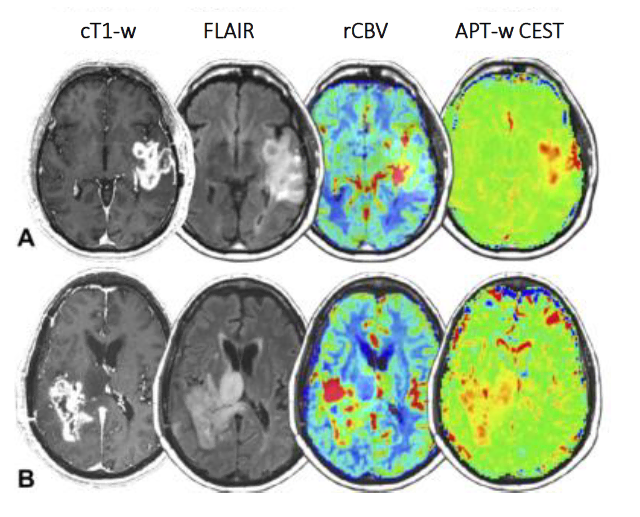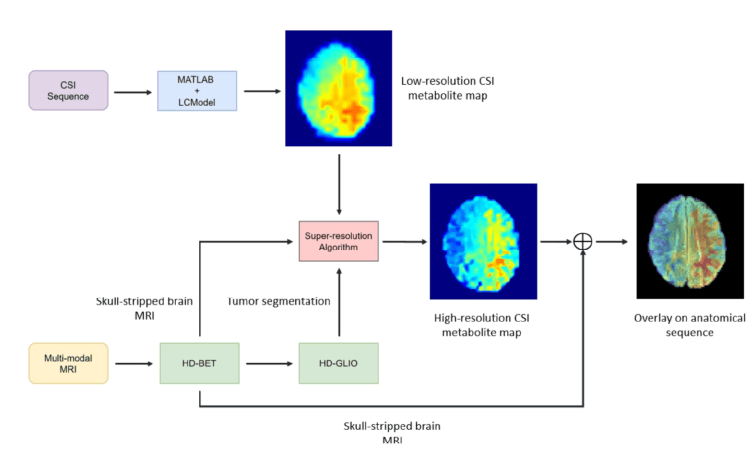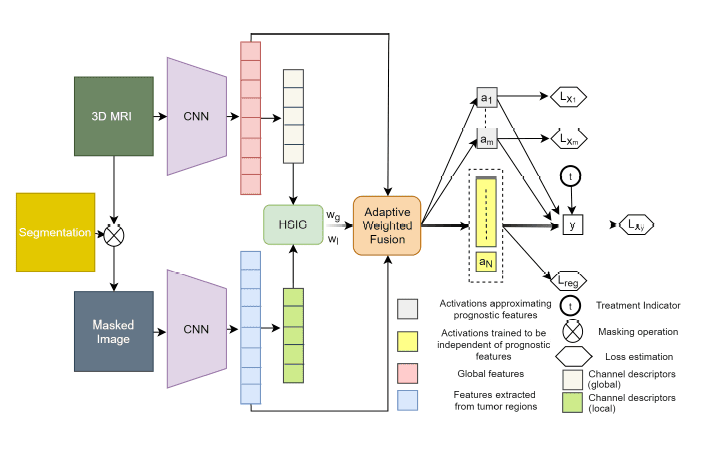Research > Focus C > Work Packages C02
Summary
The aim of this project is to explore novel MRI sequences that rely on a unique detection enhancement technique for low-concentration biomolecules, implement clinical grade molecular imaging methods, and develop novel artificial intelligence-based approach for unbiased identification of predictive imaging signatures thereby continuing our developments of the first funding period within this context towards clinical applicability.
Task 1
Investigating novel imaging biomarkers obtained from amide proton transfer-weighted (APT-w) MRI
Steps / Workflow
- Apply and clinically validate APTw MRI for deriving novel imaging biomarkers that may allow to improve the accuracy for predicting treatment response and progression in patients with glioblastoma.
- Execute a prospective test retest study to establish the robustness of APT-w MRI
- Perform prospective longitudinal benchmarking against biomarkers obtained from anatomical & advanced MRI in a clinical setting.
Task 2
Clinically deploying molecular imaging methods for IDH-mutant gliomas via super resolution 2HG-directed MR spectroscopy
Steps / Workflow
- Extend and refine clinical grade molecular imaging methods for IDH-mutant gliomas by implementing an AI based super resolution MRSI method.
- Implement automated end to end processing of MRSI data to enable deployment into a clinical setting.
- Assess its potential in a prospective clinical setting for improving monitoring and prediction of treatment response and resistance in IDH-mutant gliomas through quantification of intratumoral 2HG.
Task 3
Developing novel deep-learning based approaches for unbiased identification of predictive imaging signatures in neuro-oncology
Steps / Workflow
- Develop and validate novel AI based classification models that may allow to identify truly predictive imaging signatures unconfounded from prognostic effects.
- Address and overcome the limitations of routine imaging biomarkers / radiomic based approaches to identify predictive imaging biomarkers.
- Analysis will be performed in various clinical trial datasets available within the UNITE consortium for unbiased identification of predictive imaging signatures both in the adult (e.g., N2M2 study) and pediatric (e.g., MNP2.0 study) setting.

BENDSZUS, MARTIN, PROF. DR. MED.
University Hospital Heidelberg, Department of Neuroradiology, Im Neuenheimer Feld 400, 69120 Heidelberg, Germany

VOLLMUTH, PHILIPP, PROF. DR. MED., MBA
University Hospital Heidelberg, Department of Neuroradiology, Im Neuenheimer Feld 400, 69120 Heidelberg, Germany
Address
Im Neuenheimer Feld 400
69120 Heidelberg
Themen
Research
- Focus A
- A01: Targeting tumor cell network communication to overcome primary and adaptive resistance in glioblastoma
- A02: Development of a specific combination therapy for histone H3-mutant pediatric glioblastoma
- A03: Deciphering resistance against targeted treatments
- A04: Elucidating tumor-associated microglia interactions in astrocytomas CNS WHO-grade 4
- A05: Predictive biomarkers for MGMT-promoter-methylated glioblastoma (2019 – 2023)
- A06: Resistance mechanisms of glioblastoma against alkylating agents and radiotherapy
- A07: Mapping and targeting neuron-tumor networks to tackle therapy resistance in glioblastoma
- A08: Personalized glioblastoma treatment guided by patient-derived tumor organoids
Research
- Focus B
- B01: Mechanisms of response and resistance to glioma-specific t cells
- B02: DNA mis-match repair regulates immune checkpoint blockade therapy in glioblastoma (2019 – 2023)
- B03: Targeting immunosuppressive programs in isocitrate dehydrogenase mutant gliomas
- B04: Impact of myeloid cells on the adaptive immune response in newly diagnosed and recurrent glioblastomas
- B05: Dissecting the response of glioblastoma and its tumor microenvironment to focused high-dose radiotherapy (2019 – 2023)
- B06: Visualization and characterization of immune responses in H3K27M mutant gliomas
Research
- Focus C
- C01: Comprehensive preclinical pharmacology testing of drugs used for glioblastoma treatment
- C02: Radiomics, radiogenomics and deep-learning in neurooncology
- C03: Imaging immune signatures of glioma response and resistance towards immunotherapy (2019 – 2023)
- C04: Metabolic signaling in glioblastoma: a spatial multi-omics approach
- C05: Overcoming glioma radio-resistance with particle therapy
- C06: Functional characterization of EGFR structural variants associated with long-term survival in glioblastoma, IDH-WT




